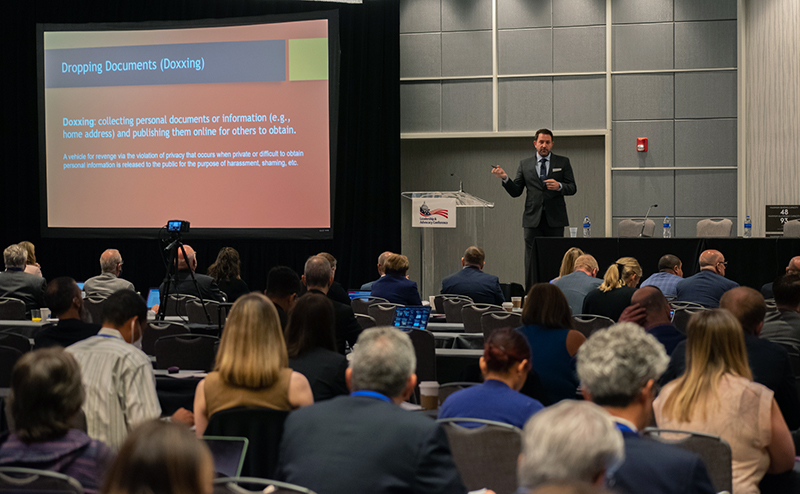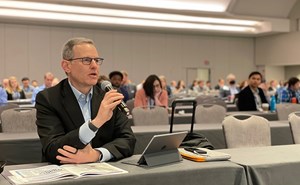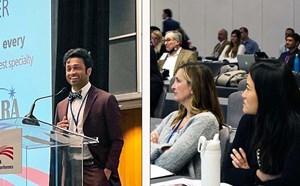Hundreds of emergency physicians are gathered in Washington, DC, for the Leadership & Advocacy Conference. The programming kicked off yesterday with the Health Policy Primer, and today's schedule includes the Leadership Summit, keynote address and more.
Follow along with today's live blog below and join the conversation on social media (#LAC22).
- Sunday's recap: Check out our updates from Day 1.
- Tuesday's live blog: Day 3
Monday, May 2 | 4:50 p.m. ET
Let’s wind down with some downcoding content, shall we? A panel shared lessons learned from an ongoing downcoding problem in Virginia. They're actively pushing back on the policy every way they can as part of an unprecedented two-year battle:
- Appealing directly to CPS
- Filing a lawsuit
- Seeking a legislative solution
- Medicaid workgroup
During the Q&A session at the end of the panel, Dr. Stephen Anderson recounted his own similar downcoding advocacy battle and commended the Virginia team on its relentless efforts, summing up the day -- and really, the point of LAC in general:
"Bad policy is bad policy, and you have to stand up to it."
Monday, May 2 | 4:00 p.m. ET
Sen. Tim Kaine (D-VA) started a conversation about physician mental health with a heartfelt thank you for each emergency physicians’ dedication throughout the pandemic to both clinical work and advocacy.
In discussing the Dr. Lorna Breen Health Care Provider Protection Act, Kaine said, “ACEP has been a key champion the whole way through. You helped us draft, fund, and pass this bill.”
He talked about the impetus for this landmark legislation.
“If you would’ve told us in March that a million people would die, nobody would believe it. This has touched everyone. But it hasn’t touched everyone equally. Of any group of people that COVID has impacted, I think of emergency physicians. Dealing with this virus day in and day out? Nobody can go through that and emerge as the same person that they were.”
“We needed to figure out how to lighten the load of people who have been put on a pedestal but are really just flesh and blood,” he said.
As Sen. Kaine painted the picture of Dr. Breen’s experience, there were heads nodding in the audience. “She got COVID in the earlier days of the pandemic,” he said. “There was not enough PPE and a lot of uncertainty. When she tried to return to work, she came back to a different reality.”
Dr. Breen was extraordinarily concerned about her patients, “but she also felt that seeking help could cost her job or her license,” Sen. Kaine explained. “If we can do better, we can avoid tragedies.”
Many emergency physicians are wondering what will happen next now that the bill has passed.
“We’re not done,” Sen. Kaine said. “We’ve got work to do in the profession and with state regulatory authorities. I’m going to count on you for the next chapter.”
“There will come a day when the public health emergency is over,” Sen. Kaine concluded. “But the mental health challenges will not be over. The tail of COVID consequences calls for more work.”
Related Resources:
Monday, May 2 | 2:45 p.m. ET
During the "The Great Consolidation: What Role Can Policymakers Play in Ensuring Fairness in Health Care Markets" panel discussion, Rohan Pai, Deputy Assistant Director, Mergers IV for Federal Trade Commission Bureau of Competition, talked about the FTC's role with health care provider mergers: "Our main goal is try to prevent harmful mergers from occurring in the first place."
He said many troubling mergers often fall below the size threshold for reporting to the FTC, so the agency doesn't hear about them until they are already done. Mr. Pai encouraged our audience to use the anonymous reporting mechanism on the FTC website to alert them to potentially harmful mergers in their respective communities so the FTC can consider getting involved. He said they take those messages seriously.
"Talking to the people who live this day-to-day is how we build these cases."
Monday, May 2 | 2:40 p.m. ET
Now we're back to a common topic at this LAC - consolidation. ACEP's Senior Vice President for Advocacy and External Affairs Laura Wooster, MPH, is presenting data from ACEP's recent collection of personal stories about the effects of mergers and consolidation. (Laura explains more in this video.)
- Related: See what ACEP is doing related to physician autonomy.
Monday, May 2 | 2:20 p.m. ET
It's Mental Health Awareness Month, and Admiral Levine spoke at length about the importance of addressing the behavioral health crisis.
"Behavioral health is a critical issue that we must address, and will address, at HHS," Admiral Levine said. "I know that all of you are on the front lines [of this crisis] in your emergency department.”
Admiral Levine closed her remarks with another important mental health message for our audience:
"Clearly, the dedication of our emergency medicine physicians has shone through during this pandemic," Admiral Levine said. "Please remember to take career of your own physical and mental health. You can only help others if you are helping yourself too."
Monday, May 2 | 2:00 p.m. ET
Keynote Speaker Admiral Rachel L. Levine, MD, Assistant Secretary for Health - U.S. Department of Health and Human Services, got big applause from the crowd when she talked about the recent elimination of the training requirements for the X-waiver.
"I know it's still difficult, though," Admiral Levine said. "We would actually like to do away with the X-waiver." (This got even bigger applause.)
"This would require a literal act of Congress," Admiral Levine explained. "We’ve done everything we can at HHS. It takes Congress to eliminate the X-waiver."
Monday, May 2 | 1:50 p.m. ET
And we're back! Everyone grabbed lunch, and now we're ready for the keynote address by Admiral Rachel L. Levine, MD, Assistant Secretary for Health - U.S. Department of Health and Human Services.
Monday, May 2 | 12:30 p.m. ET
Aisha T. Terry, MD, FACEP, vice president of ACEP, moderated a “Women in Politics” discussion, featuring Senator Tammy Baldwin (D-MI), an influential lawmaker and lead senate sponsor of legislation to address violence in the emergency department.
“Violence in the ED has long been an occupational hazard and incidents are increasing,” said Dr. Terry.
Addressing violence against health care workers is a key ACEP priority. Sen. Baldwin is leading the Senate effort to pass the “Workplace Violence Prevention for Health Care and Social Service Workers Act,” which directs the Occupational Safety and Health Administration (OSHA) to create an enforceable standard to ensure that health care and social services workplaces implement violence prevention, tracking, and response systems.
On ED violence, Baldwin remarked, “This is not a partisan issue. We all have an expectation that we should be safe in our workplace.”
Sen. Baldwin shared her struggle with childhood illness and explained how that stirred her passion for addressing injustice in health care. At multiple points in her career, she has been told that voters would not be ready for an openly gay female legislator. “There are doubters at every stage. Fortunately, we tried and we won,” she said. “As a woman, I am much more than a label —we have come a long way.”
Dr. Terry reminded the room of ACEPs new strategic plan and its emphasis on advocacy, asking Sen. Baldwin for tips on how to be an effective issue champion.
“Sharing your personal stories makes a difference,” said Sen. Baldwin. “Find common interests and build relationships to advance legislative priorities. When legislators have emergency physicians as colleagues and friends, you are able to have very different conversations.”
Monday, May 2 | 11:15 a.m. ET
Gillian Schmitz, MD, FACEP, president of ACEP, moderated a panel, “Saying Nope to Expanded Scope: States and Organizations Fighting for Quality Emergency Care.”
ACEP state chapters have firsthand experience pushing back on dangerous scope legislation and advocating for physician-led practice. Luke LeBas, MD, FACEP, discussed his chapter’s advocacy and shared insights gained as a result of the first scope of practice win in Louisiana.
“Grassroots advocacy is so important,” he said. “You have to be active and excited. Getting organized and proactive—that’s going to lead to success.”
“Efforts to show the value of physician-led teams are working and data helps tell our story to lawmakers and patients,” added Jamie Dahliwal, MD, FACEP, an emergency physician in Colorado, where legislation that would have loosened restrictions on physician assistant practice was defeated in March 2022.
Dr. Schmitz highlighted a new ACEP video series, “Who is an Emergency Physician?”, which explains in clear terms that emergency physicians are the most highly trained and educated professionals available in an emergency. They are the most qualified to lead the care teams in every emergency department in the country.
Related Resources:
- Emergency Physician Workforce of the Future
- Emergency Physician Rights & Responsibilities
- Guidelines Regarding the Role of Physician Assistants and Advanced Practice Registered Nurses in the Emergency Department
Monday, May 2 | 10:15 a.m. ET
It was a father/son affair during our third session of the day. Bob Sugarman, JD, and his son Thomas Sugarman, MD, FACEP, FAAEM, were joined by Ro Gonsalves, MD, to talk about the pros and cons of unionization.
Dr. Sugarman spoke to the unique complexities of potential unionization and collective bargaining for emergency physicians, particularly within the context of current consolidation challenges in health care.
“There’s a paradox here," Dr. Sugarman explained. "We can consolidate into a union, but that consolidation may be what we’re trying to avoid in the first place.”
He talked about how unions are promising for addressing just cause/working projections, which is really relevant right now because due process is one of the key protections we’re advocating for during LAC22.
Dr. Gonsalves shared the story of formation of the Alameda Health System Physician Union, a group of attending physicians in the Bay Area. Their initial conversations in June 2020 turned into the formation of this union that is currently negotiating its first employment contract. “There are themes here in the reasons why we unionized,” Dr. Gonsalves said. “Job security, more effective patient advocacy and negotiating power.”
Monday, May 2 | 9:15 a.m. ET
James Phillips, MD, FACEP, discussed his firsthand experience with violence in the emergency department.
He told a harrowing tale of treating a patient who spat potentially infected blood all over him. Dr. Phillips spoke bluntly to the crowded room of emergency physicians, “You are in the most violence industry in America outside of law enforcement. And incidents are underreported.”
He expanded on the difficulty in taking an evidence-based approach to ED violence and was proud to declare that ACEP is taking the lead on the federal advocacy necessary to address and curb violent acts in the emergency department with legislators and regulators.
A comprehensive approach starts with acknowledging the problem and urging our employers and elected officials to take meaningful steps to address the issue, he said.
“We are here today to get our leadership to protect us. Because we deserve to be protected,” said Dr. Phillips.
Related resources:
Monday, May 2 | 8:30 a.m. ET
Dr. Liselotte (Lotte) Dyrbye, MD, MHPE, kicked off the 2022 Leadership Summit with a comprehensive, data-filled presentation about the factors and solutions surrounding clinician burnout. Dr. Dyrbye presented data on burnout by specialty, life stage, race, systemic process and more. She talked about how complicated and prevalent the issue of burnout is throughout health care. Since the problem is multifactorial, there isn't one solution. She encouraged the audience to look at solutions through the "lens of shared responsibility."
“As a leader in this space, 80% of the effort needs to be about improving the system,” Dr. Durbye said.
Monday, May 2 | 8:27 a.m. ET
In the words of Dr. Cedric Dark, we have a packed house today. Let's get started!
Monday, May 2 | 8:00 a.m. ET
ACEP Executive Director Sue Sedory, MPH, started the day with a quick overview of ACEP's new strategic plan. She explained the five pillars of the plan and how advocacy, this week's mission, factors into the future of the specialty.
She asked the many first-time LAC attendees in the crowd to stand up and be recognized, and then she asked those who attended one of the first five LAC conferences to stand.
Gesturing toward the mix of veteran and new advocates, she closed her remarks saying, "This is such a testament to what ACEP is about and what this event is all about."






